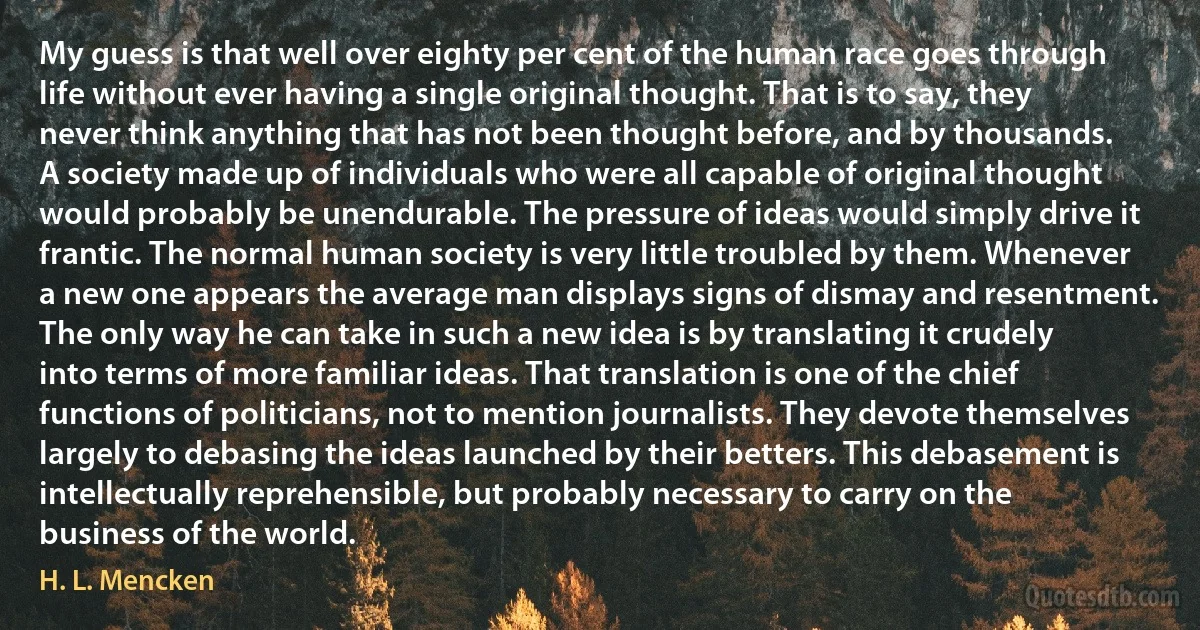Translation Quotes - page 5
Our sense of touch is a fundamental sensibility which comes into action at birth – our stereognostic sense – the ability to feel weight and form and assess its significance. The form which have had special meaning for me since childhood have been the standing form (which is the translation of my feelings towards the human being standing in the landscape) the two forms (which is the tender relation of one living thing besides another); and the closed form, such as the oval, spherical or pierced form (sometimes incorporating colour) which translates for me the association and meaning of gesture in landscape; in the repose of say a mother and child.... In all these shapes the translation of what one feels about man and nature must be conveyed by the sculptor in terms of mass, inner tension, and rhythm, scale in relation to our human size and the quality of surface which speaks through our hands and eyes.

Barbara Hepworth
You are in the courtroom of world opinion.... All right, sir, let me ask you one simple question: Do you, Ambassador Zorin, deny that the U.S.S.R. has placed and is placing medium- and intermediate-range missiles and sites in Cuba? Yes or no - don't wait for the translation - yes or no?" [The Soviet representative refuses to answer.] "You can answer yes or no. You have denied they exist. I want to know if I understood you correctly. I am prepared to wait for my answer until hell freezes over, if that's your decision. And I am also prepared to present the evidence in this room.

Adlai Stevenson II
That Fingal is not from beginning to end a translation from the Gallick, but that some passages have been supplied by the editor to connect the whole, I have heard admitted by very warm advocates for its authenticity. If this be the case, why are not these distinctly ascertained? Antiquaries, and admirers of the work, may complain, that they are in a situation similar to that of the unhappy gentleman whose wife informed him, on her death-bed, that one of their reputed children was not his; and, when he eagerly begged her to declare which of them it was, she answered, 'That you shall never know', and expired, leaving him in irremediable doubt as to them all.

James Macpherson
My books must be an absolute nightmare to translate. I wouldn't do it. I had a couple of them in Japanese some years ago and my wife met a Japanese woman who said that she had read the books. And she asked her what the translations were like. This woman said they were the worst translation she had ever read in her life. She said she didn't recognise the books when she finally read them in English.

John Banville
I was very much surprised when Mill informed me that he had not read a line of Hegel, either in the original or in translation, and regarded the entire Hegelian philosophy as sterile and empty sophistry. I mentally confronted this with the opinion of the man at the Copenhagen University who knew the history of philosophy best, my teacher, Hans Brochner, who knew, so to speak, nothing of contemporary English and French philosophy, and did not think them worth studying. I came to the conclusion that here was a task for one who understood the thinkers of the two directions, who did not mutually understand one another. I thought that in philosophy, too, I knew what I wanted, and saw a road open in front of me.

Georg Brandes
Here the idea of God has been replaced by the idea of the Future. The two notions are, admittedly, all but identical in the way in which they are self-contradictory and thus always fundamentally confusing to their worshippers, who must look to priests for translation, and so inevitably the priests (or whatever they call them) gradually take power...

Michael Moorcock
The social organization of work is the most complicated and difficult problem that humanity has ever had to solve. It being possible to realize that organization (a difficult translation or me: "Cette organisation ne pouvant être réalisée par", Fr.) neither by violence, nor by merely external (or outward) or legal measures, it require the free participation of all (or everybody) to the joint (or common, or in commun) work, and, consequently, to a regeneration (or reconditioning) of men that bring them to overcome their selfishness et understand their duty towards themselves et towards the community.

African Spir
In the office there are about fifteen people whose attention is directed toward a table covered with the costly fabric [raw cotton]; one man is bent over the table and another is sort of seating on it – the buyer and the broker are discussing a sample. A painting of a vernacular subject, if there is such a thing, and I think by a better hand than most others (a size 40 canvas, I think). I'm planning another less complicated and more surprising yet, better art, in which everyone is in summer dress, the walls white, and a sea of cotton on the tables. (translation based on M. Kay's, in M. Gérin [ed.] and M. Kay, transl. 'Degas letters', Oxford, 1947, pp. 29-30, no. 2.

Edgar Degas
the same year in which I began Latin, I made my first commencement in the Greek poet with the Iliad. After I had made some progress in this, my father put Pope's translation into my hands. It was the first English verse I had cared to read, and it became one of the books in which for many years I most delighted: I think I must have read it from twenty to thirty times through. I should not have thought it worth while to mention a taste apparently so natural to boyhood, if I had not, as I think, observed that the keen enjoyment of this brilliant specimen of narrative and versification is not so universal with boys, as I should have expected both a priori and from my individual experience.

John Stuart Mill



